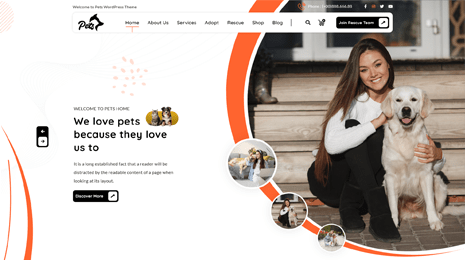Introduction:
There’s more to improving WooCommerce search bar user experiences than slick landing pages and complex designs. The goal is to maximise search functionality so that customers can find what they’re looking for more quickly, which will lead to higher sales.
The perfect platform for starting your own online shop is offered by search bars . However, personalizing the product search function is essential to realizing its full potential. Your intended audience’s search experience is made simpler with this modification, which enhances the possibility that some of them could turn into paying customers.
Why Should WooCommerce Product Search Be Customised:
WooCommerce search bar accept items at face value by default. It is limited to comprehending and indexing post snippets, titles, and content. This indicates that it lacks knowledge of the complexities of the product on its own.
For example, although a bag and a bag for travelling have different meanings in the WordPress default search, as a manager or store owner knows that they can have the same value. Furthermore, even if your audience doesn’t look for a perfect match, they still want them to get the appropriate results. Customising your WooCommerce search for products is useful in this instance.
Customizing the WooCommerce product search is essential for optimizing user experience, improving search accuracy, maintaining brand consistency, and gaining a competitive advantage. When using premium WordPress themes, customization allows you to align your product search seamlessly with the overall design and premium features, creating a high-quality and engaging online shopping environment for your customers.
Here’s why you should:
- It facilitates your visitors’ capacity to locate what they’ve been looking for.
- to improve an understanding of what you sell by your users. You can include categories as well as pertinent tags that you want to get indexed in.
- You can better fulfil the intent of the intended target group.
- You don’t want to lose clients simply because they entered a keyword that wasn’t an accurate match for the good you sell.
In the end, the objective is to increase the financial viability of your store. Sadly, though, very few WooCommerce business owners take full advantage of this capability. Their profits aren’t optimised as a result, and they want there to be some way to fix this.
There is, without any uncertainty. There is never an issue with WordPress and WooCommerce that cannot be resolved. I’ll go over the two strategies for expanding your WooCommerce business and customising the goods you sell here.
If you are building a Woocommerce website, Here’s your way; we have listed some of the best Woocommerce WordPress Themes by VW Themes. This curated list consist of best themes with woocommerce compatibility and sleek design.
How to Integrate WooCommerce with Custom Product Search:
WooCommerce’s integrated search for goods function might not be sufficiently powerful for handling big catalogues of products efficiently. Fortunately, there are actually two ways of tackling this problem:
- Making modifications to the program’s code
- Using a plugin
1. Using Code, Add Custom Item WooCommerce search bar
This is a short, step-by-step guide on how to implement code to override the built-in product search form. For this, I’ll make use of the get_product_search_form filter. You may utilise a custom template with the filename product_search_form.php.
Replace the standard search for goods form in the product search widget by adding an additional code sample to functions.php, which is found in the themes folder.
add_filter( 'get_product_search_form' , 'woo_custom_product_searchform' );
function woo_custom_product_searchform( $form ) {
$form = '<form role="search" method="get" id="searchform" action="' . esc_url( home_url( '/' ) ) . '">
<div>
<label class="screen-reader-text" for="s">' . __( 'Search for:', 'woocommerce' ) .'</label>
<input type="text" value="' . get_search_query() . '" name="s" id="s" placeholder="' . __( 'My Search form', 'woocommerce' ) . '" />
<input type="submit" id="searchsubmit" value="'. esc_attr__( 'Search', 'woocommerce' ) .'" />
<input type="hidden" name="post_type" value="product" />
</div>
</form>';
return $form;
}- Go to the folder for the design.
- Create “product_search_form.php” a new file.
- Start the file “product_search_form.php.”
- Put the code afterward into the file:
$form = '<form role="search" method="get" id="searchform" action="' . esc_url( home_url( '/' ) ) . '">
<div>
<label class="screen-reader-text" for="s">' . __( 'Search for:', 'woocommerce' ) . '</label>
<input type="text" value="' . get_search_query() . '" name="s" id="s" placeholder="'. __( 'My Super Search form', 'woocommerce' ). '" />
<input type="submit" id="searchsubmit" value="'. esc_attr__( 'Search', 'woocommerce' ).'" />
<input type="hidden" name="post_type" value="product" />
</div></form>';
echo $form;Please take note that any filter-based techniques will be superseded by the template file. This implies that the existence of the file containing the template will guarantee that your search form originated from the file in question and not the template, regardless of whether you apply a filter.
Another personalised snippet you as a user can utilise to construct an AJAX-based search. It is possible to change the search criteria with this snippet. Additionally, if you set ajax_disable to TRUE, users might also deactivate AJAX-based search.
global $avia_config;
$search_params = apply_filters('avf_frontend_search_form_param', array('placeholder' => __('Search','avia_framework'),'search_id' =>'s','form_action' => home_url( '/' ),'ajax_disable' => false));
$disable_ajax = $search_params['ajax_disable'] == false? "": "av_disable_ajax_search";
$icon = av_icon_char('search');
$class = av_icon_class('search'); ?>
<form role="search" method="get" id="searchform" action="<?php echo home_url( '/' );?>">
<div>
<label class="screen-reader-text" for="s"> Search for:</label>
<input type="text" name="s" id="s" placeholder='<?php echo $search_params['placeholder'];?>' />
<input type="submit" id="searchsubmit" value="<?php echo $icon;?>" class="button <?php echo $class;?>" />
<input type="hidden" name="post_type" value="product">
</div></form>If you’d prefer to code yourself, all you need to create a unique WooCommerce search engine is the provided code. But programming needs technical know-how. As an alternative, using a plugin can make setup simpler.
Keep in mind that setting a unique WooCommerce product search with a plugin is almost identical to setting it through code. But each has benefits of its own.
More customisation opportunities can be utilised when code is used, improving the search experience for users. It could still call for technical support.
Nevertheless, although there might be some restrictions, plugins let you easily create a much better personalised search. Let’s talk about the plugin now.
2. How to Use Plugins to Add Custom Item Search to WooCommerce:
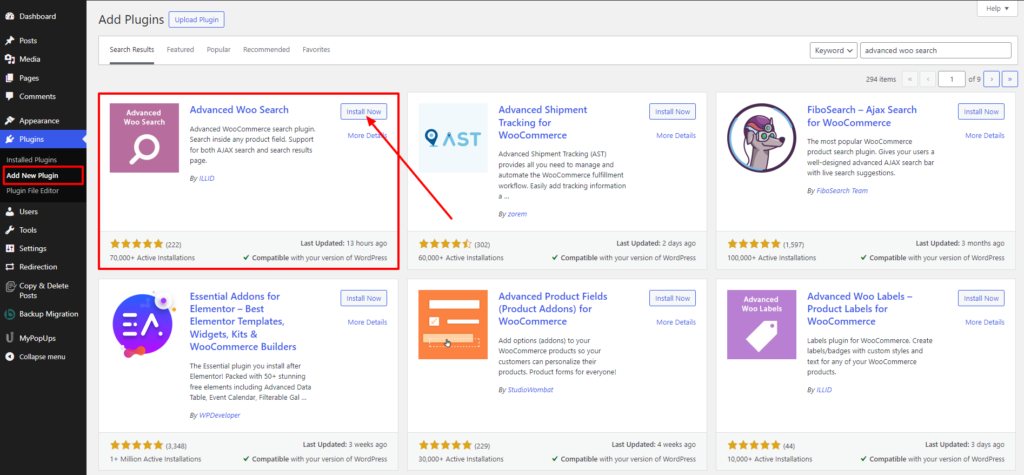
Take the steps listed below:
- Select “Plugins” from the menu on the left-hand side of your WordPress dashboard.
- From the drop-down menu, select “Add New”.
- Press Enter after typing “advanced Woo Search” into the search bar.
- Select “Install Now” next to the “Advanced Woo Search” plugin after finding it.
After installation is complete, an “Activate” button will show up. To make the plugin active, click on it.
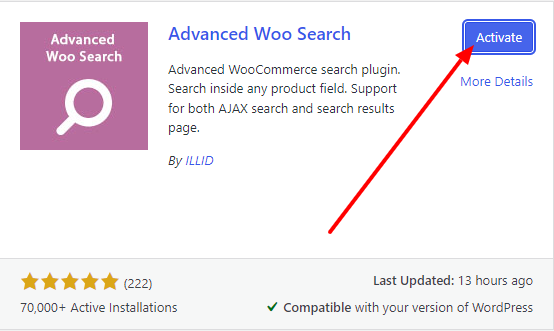
Access to your WordPress website’s back panel after activation.
Look for the “Advanced Woo Search” plugin, which is unlocked.
To personalise your WooCommerce search bar , click the plugin to view its features and settings.

You can modify the plugin’s numerous options to better match the search terms used by the audience you are targeting.
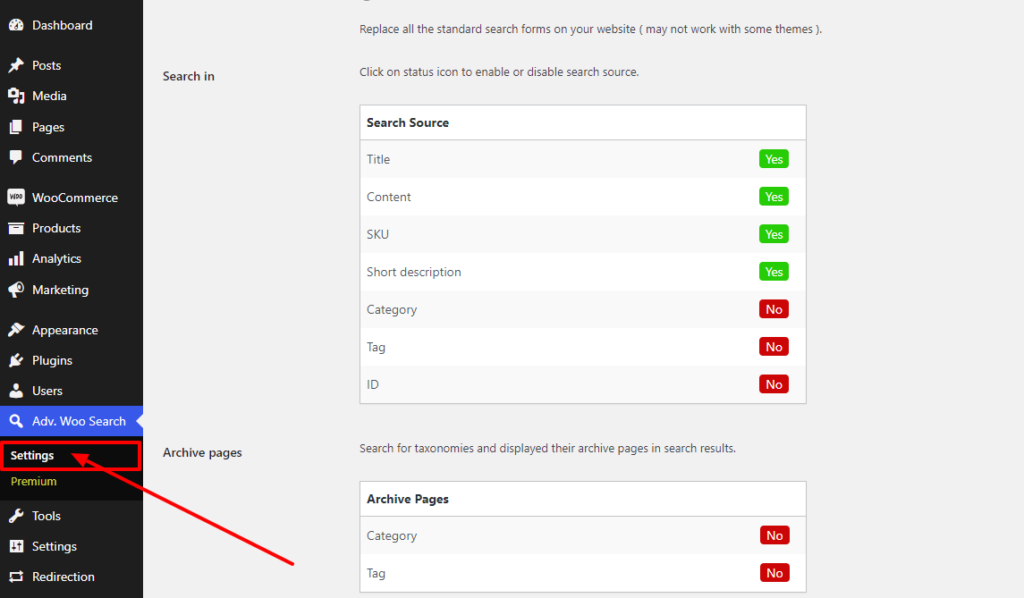
In order to better understand the requirements of your clients and improve their search experience, the plug-in additionally presents reports on customer behaviors related to their searches.
- Go to “WooCommerce” in the dashboard of your WordPress site to start generating reports.
- Click on “Reports” in the menu.
- You can modify the Reports section’s variables to suit your needs and tastes.
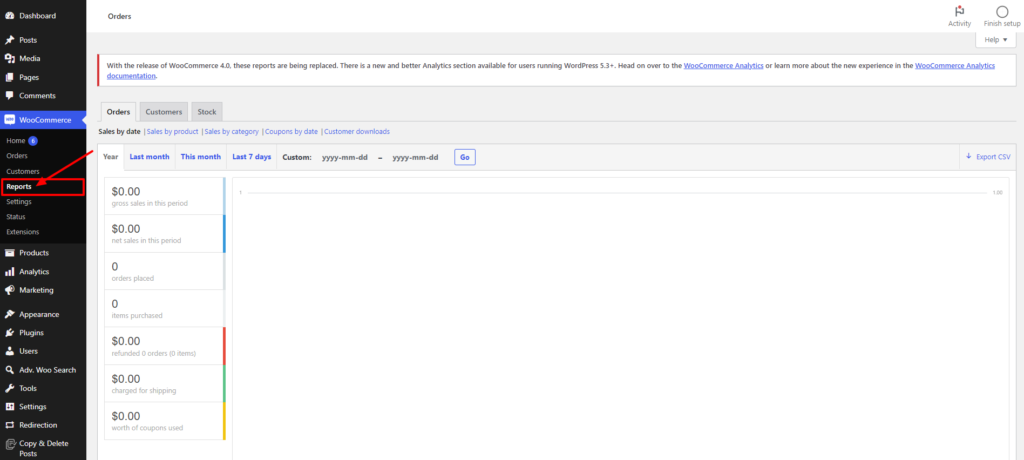
The Top 5 WooCommerce Plugins for Custom Product Search:
To add custom WooCommerce search bar , users may use a number of plugins. Here, I’ll go over the top five that will enable you to create personalised searches for goods for WooCommerce. Remember that using several plugins comes with add-ons that support functions outside of creating custom searches.
Certain plugins, for example, can assist you in optimizing the contents and descriptions of your products so that they rank more highly in the search engine results. Now let’s examine the best custom search plugins.
1. WooCommerce Product Search:

For WooCommerce stores, WooCommerce Product Search offers outstanding optimisation. Because of its many customisable choices, product titles can be fully customised, giving users quick access to search results.
Anyone may learn to use the plugin’s extremely intuitive interface for product searches with ease.
Among the most important features are:
- Customers can easily view several relevant items at once with live search and live filtering.
- It is very simple to set up and use.
- Offers data and business insight to assist users in managing the store more effectively.
2. WooCommerce Product Filters:
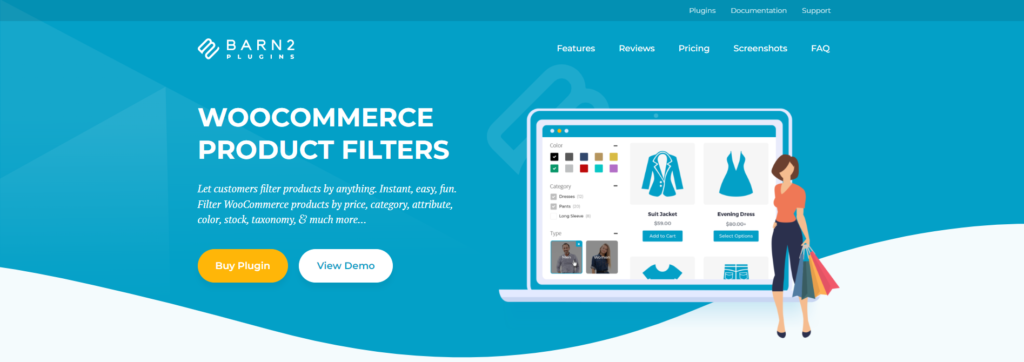
Effective custom product searches may be performed easily by using the WooCommerce Product Filters plugin. To make sure that your target market finds what they’ve been looking for, this plugin has a tons of benefits. It is worth making the purchase because of the following notable features:
- Multiple options for filtering the products include gender, categories, colours, tags, and more.
- Option to select traditional or AJAX filters.
- Different finger styles are available to help customers navigate the store with less difficulty.
If you are in search of filter plugin, You can go through the curated list of product filter plugins in our previous blog.
3. Advanced Woo Search:

Another freeware plugin you may use to personalise your product search is called Advanced Woo Search. This plugin stands out from the others due to its interesting feature of allowing images and pricing to appear in the search results.
Adding appealing pictures to your search engine’s display will help attract more visitors and increase income.
Among the essential elements are:
- lets you organize searches for goods based on tags, categories, and other criteria.
- enables you to divide products according to different SKUs.
- supports several KW search iterations to improve users’ search experiences.
4. YITH WooCommerce AJAX Search:

You can customise product searches for your WooCommerce shops by utilising one of the many intriguing features offered by YITH WooCommerce AJAX Search. It offers a range of choices to make navigation easier for your visitors.
To improve user expertise, the WooCommerce Product Search plugin also provides other capabilities. It makes it possible for product images to appear in the search bar menus that drop down, which effectively draws customers in and boosts the number of clicks. To further encourage visitors to participate, you can additionally draw attention to discounts and bargains by highlighting them.
Let’s look at some of this product’s notable features:
- Give your visitors an amazing experience when they search.
- Permit users to look up items using SKUs.
- To increase conversions, draw interest in limited-edition items or options for sales.
5. SearchWP:
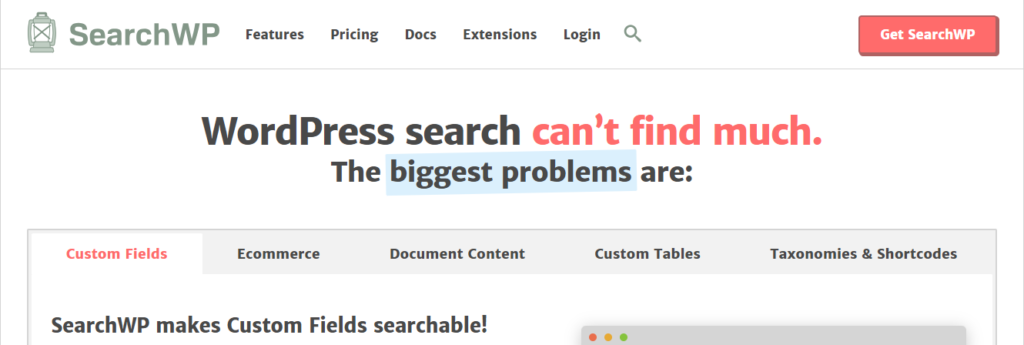
Another way to customise your WooCommerce product searches is to use SearchWP. It is an increase plugin that enhances the functionality of your WooCommerce stores. Its UI is easy to use, and there is very little learning curve.
For WooCommerce users searching for product customisation, you should think about using this plugin for the following reasons:
- Offers details regarding the behaviors of customers.
- Automatically works with popular ones like Avada, Divi, and Astra, among others.
- It allows you to create filters so that buyers can find things based on intent rather than exact phrases.
Conclusion:
In conclusion, integrating a WooCommerce search bar on your product store through plugins is a straightforward process that enhances the overall user experience and navigability of your online store. By leveraging the flexibility and functionality of plugins designed for WooCommerce, you can easily add a powerful search feature to help your customers find products quickly and efficiently.
When selecting plugins for your search bar, it’s essential to consider your specific needs and requirements. Some popular plugins offer advanced search capabilities, customizable settings, and seamless integration with your existing WooCommerce setup. Ensure compatibility with your WordPress theme to maintain a cohesive and visually appealing design throughout your website.
Additionally, if you’re using a WordPress theme bundle that includes WooCommerce support, you may find that the theme already comes with built-in styling and features for WooCommerce elements, including the search bar. This can provide a consistent and polished look for your entire online store, ensuring that the search functionality seamlessly aligns with the overall design aesthetics of your website.
In summary, by carefully selecting and configuring WooCommerce search bar plugins and ensuring compatibility with your WordPress theme bundle, you can enhance the functionality of your product store, making it more user-friendly and improving the overall shopping experience for your customers.









